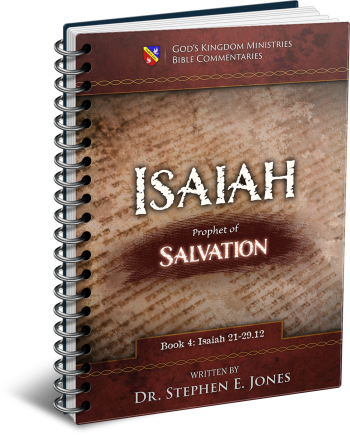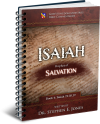Latest Posts
View the latest posts in an easy-to-read list format, with filtering options.

Isaiah is the prophet of Salvation. He is also known as the truly "Universalist" prophet, by which is meant that He makes it clear that salvation is extended equally to all nations and not just to Israel. He lived to see the fall of Israel and the deportation of the Israelites to Assyria, and he prophesied of their "return" to God (through repentance). He is truly a "major prophet" whose prophecies greatly influenced the Apostle Paul in the New Testament.
Category - Bible Commentaries

After speaking of the judgment upon Jerusalem and the earth as a whole, Isaiah abruptly turns his attention to the overcomers, who are compared to the gleanings in the time of harvest.
Isaiah 24:13, 14 says,
13 For thus it will be in the midst of the earth among the peoples, as the shaking of an olive tree, as the gleanings when the grape harvest is over. 14 They raise their voices, they shout for joy; they cry out from the west concerning the majesty of the Lord.
At harvest time, men shake the olive trees, and most olives fall to the ground. The olives that do not fall are “the gleanings” that are reserved for the poor, the widows, and the orphans. These are the olives that are not shaken by end-time harvest events. While the city and the earth have no joy and are depressed, with their heads drooping, there are a few (“the gleanings”) who “shout for joy.”
We have already seen previously in Isaiah 17:5, 6 how the prophet speaks of the gleanings in terms of the overcomers and how the gleanings represent the overcomers—those set apart and devoted to God for His use (Deut. 24:20). Isaiah does not fail to give hope to the righteous in the midst of general despair.
In fact, one of the marks of an overcomer is that he is not shaken, for Psalm 55:22 says, “He will never allow the righteous to be shaken.” Hag. 2:6, 7 says,
6 For thus says the Lord of hosts, “Once more in a little while, I am going to shake the heavens and the earth, the sea also and the dry land. 7 I will shake all the nations…”
Hebrews 12:27 interprets this, saying,
27 The expression, “Yet once more,” denotes the removing of those things which can be shaken, as of created things, so that those things which cannot be shaken may remain.
This, then, should be our worldview. We are observing the harvest at the end of the age. We see the great shaking taking place, and many olives are falling to the ground in the harvest. However, we ourselves are not shaken but remain in the olive tree to feed the poor, the widow, and the orphan who have no covering other than God Himself.
Isaiah 24:15, 16 continues,
15 Therefore glorify the Lord in the east, the name of the Lord, the God of Israel, in the coastlands of the sea. 16 From the ends of the earth we hear songs, “Glory to the Righteous One”….
The overcomers “from the ends of the earth” are heard singing a song entitled, “Glory to the Righteous One.” They rejoice, for they know that the time of harvest will benefit them and that the “Kingdom which cannot be shaken” will remain standing (Heb. 12:28).
But only a few have this hope. Only a few are able to rejoice.
The prophet continues in the latter part of Isaiah 24:16, 17,
16 … But I say, “Woe [raziy] to me! Woe [raziy] to me! Alas [oy] for me! The treacherous deal treacherously, and the treacherous deal very treacherously.” 17 Terror [pakhad] and pit [pakhath] and snare [pakh] confront you, O inhabitant of the earth.
Raziy is translated “leanness” in the KJV. That is the literal meaning of the word. It is from the root word razah, “to grow lean, famish, emaciate, consume, destroy.” The prophet was giving voice to those around him who were being shaken by the destruction. This is what he was hearing and (as an intercessor) was feeling on behalf of others. He himself was one of the righteous who could not be shaken.
The NASB renders it “woe to me!” Perhaps it could be better understood to picture men crying out, “All is lost! We are being consumed! We are being destroyed!”
The Hebrew text of Isaiah 24:17 reads, “pakhad vapakhath, happa vappakh,” using words with similar sounds as a play on words. “Terror and pit and snare” are what await those who are being shaken in the time of judgment.
Isaiah 24:18 says,
18 Then it will be that he who flees the report of disaster [pakhad] will fall into the pit [pakhath], and he who climbs out of the pit will be caught in the snare [pakh]; for the windows above are opened, and the foundations of the earth shake.
The prophet gives them no way to escape certain judgment, no matter how they may try to escape. The solution, of course, is to walk by faith, not in fear.
Isaiah 24:19, 20 says,
19 The earth is broken asunder, the earth is split through, the earth is shaken violently, 20 the earth reels to and fro like a drunkard and it totters like a shack [sways like a chair that is suspended from above], for its transgression is heavy upon it, and it will fall, never to rise again.
The prophet may have been remembering the great 8.0 Richter earthquake that had shaken both Israel and Judah when Isaiah was young. This was the main focus of Amos, who prophesied to Israel two years before the quake. (See Amos 1:1 and chapter 1 of my commentary, Amos, Missionary to Israel.).
The quake was so strong that it weakened Israel and caused a 24-year interruption of Israel’s monarchy. Assyria then took advantage of Israel’s weakness and began to conquer and deport the Israelites from 745-721 B.C.
Hence, Isaiah’s metaphor of shaking of the olive tree was well illustrated by the great earthquake that had struck the land earlier. Many still remembered how the land appeared to reel to and fro like a drunkard. But Isaiah was speaking of a later time, essentially an end-time repeat that was to collapse the governments of the entire earth in some way.
It is likely that we will witness another great earthquake—or, more likely, a series of earthquakes affecting many parts of the earth—that will weaken the nations and bring about the collapse of governments.
Isaiah 24:21, 22 says,
21 So it will happen in that day, that the Lord will punish the host of heaven on high, and the kings of the earth on earth. 22 They will be gathered together like prisoners in the dungeon and will be confined in prison; and after many days they will be punished.
How will God “punish the host of heaven on high”? Are the sun, moon, and stars to blame for the sins being done on the earth? The heavenly bodies were worshiped in the religious systems on earth, and so this is meant to convey divine judgment upon the gods of these idolaters. Similarly, the ten plagues in the days of Moses brought judgment upon the gods of Egypt.
The idea is to discredit false gods and undermine false religion so that the people turn to worship the Creator rather than the creatures.
Likewise, the kings of the earth will be arrested and “gathered together like prisoners in the dungeon.” When the prophet says, “after many days they will be punished,” we may interpret this in two ways. First, it may be that these kings will be confined in prison for “many days” before they are actually brought to trial. Secondly, the prophet may be telling us that these events will be fulfilled in the future “after many days.”
Isaiah 24:23 concludes,
23 Then the moon will be abashed and the sun ashamed, for the Lord of hosts will reign on Mount Zion and in Jerusalem. And His glory will be before His elders.
The glory of God will be seen by “His elders,” the overcomers. These are the ones who sing the song, Glory to the Righteous One in verse 16. A similar but expanded prophecy is seen in Joel 2:31, 32,
31 The sun will be turned into darkness and the moon into blood before the great and awesome day of the Lord comes. 32 And it will come about that whoever calls on the name of the Lord will be delivered; for on Mount Zion and in Jerusalem there will be those who escape, as the Lord has said, even among the survivors whom the Lord calls.
This literally occurred on the day of Christ’s death on the cross. First, the sun was darkened for three hours from noon to mid-afternoon (Luke 23:44). Then at 5:10 pm, when the full moon rose over Jerusalem, it was already eclipsed and appeared blood-red. (See The Laws of the Second Coming, chapter 1.)
It is scientifically impossible for a solar and lunar eclipse to occur on the same day. The lunar eclipse was natural, as history shows, but the darkening of the sun was supernatural. The result of Christ’s death on the cross was that “whoever calls on the name of the Lord will be delivered,” which the Apostle Paul quotes in Rom. 10:13.
Yet it is clear that this prophecy must be fulfilled again about the time of the second coming of Christ, because not everything was fulfilled at His first coming. Both Isaiah and Joel clearly say that Christ will rule “on Mount Zion and in Jerusalem” but His right to rule remained in dispute and in legal limbo for 2,000 years, as we see from Jesus’ parable (Luke 19:14 and 27).
That dispute would not be resolved until just prior to His second coming, and only then can He lawfully enforce the ruling in the Divine Court and take His throne. Meanwhile, the kingdom in the past 2,000 years has been a manifestation of the kingdom of Saul, the Pentecostal king. This must give way to the kingdom of David, who was crowned on a Jubilee and whose kingdom is manifested through Tabernacles.
To understand both Isaiah and Joel, of course, we must understand that Zion and Jerusalem were both disqualified as physical locations and were replaced with Sion and the New Jerusalem. Sion is Mount Hermon (Deut. 4:48), the place where Jesus later was transfigured and declared to be “My beloved Son” (Matt. 17:5). It has become the prophetic place where all believers must rally around Him, as prophesied in Heb. 12:22, KJV.
Genesis 49:10 (KJV) tells us that the people were to rally around “Shiloh,” a reference to the coming Messiah, “and unto Him shall the gathering of the people be.” It pictures the people united in choosing a leader and swearing allegiance to obey Him.
So also Hosea 1:11 tells us that Israel and Judah would one day be reunited under the headship of Jesus Christ. Heb. 12:22 (KJV), and verses 23 and 24 add that Mount Sion is where the sons of God unite in swearing allegiance to the Messiah.
The point is that it is no longer Zion but Sion, even as it is no longer the earthly Jerusalem but the heavenly Jerusalem. None of the Old Testament prophets distinguish between the two Jerusalems, but the two cities are clearly distinguished by Paul in Gal. 4:25, 26 and by John in Rev. 21:2. The Old Jerusalem is “Hagar” and must be “cast out” in favor of “Sarah,” the heavenly Jerusalem.
Zion is part of the Old Jerusalem and must also be cast out in favor of Sion, which is the seat of government for the New Jerusalem.